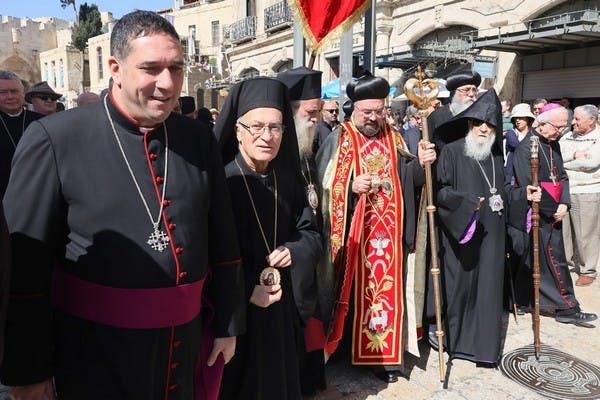Published: 23 April 2024
Last updated: 22 April 2024
An Israeli interfaith institute and local church leaders say anti-Christian hate crimes are increasing despite government and police assertions that they are tackling the problem.
The Daniel Rossing Center for Education and Dialogue, which promotes interfaith relations, is now compiling a database of hate crimes, saying many clergy and other church personnel are reluctant to report directly to the police for fears this will be held against them or be pointless.
The center is about to launch a program assigning volunteers to churches to learn from them directly about any hate crimes, program director Hana Bendcowsky told the Jewish Independent. The center will then be able to file complaints on behalf of the churches.
“Our first mission is to keep track so we can analyse and recommend solutions,” she said. In the coming weeks, the center plans to issue its first of what will become regular reports on anti-Christian hate crimes, analogous to the publication of summaries of antisemitic incidents by the Anti-Defamation League in the United States and ECAJ in Australia.
Bendcowsky and clergy say anti-Christian incidents rose noticeably in terms of number and severity last year.
Bendcowsky contends that if more of the Israeli public is aware of the problem, hate acts would be delegitimised. Bendcowsky and clergy interviewed for this article say that anti-Christian incidents rose noticeably in terms of number and severity last year, ranging from vandalism to abuse and spitting.
Local Christians are still impacted by a Jewish tourist’s smashing by hammer of a statue of Jesus in the Church of the Flagellation on the Via Dolorosa in February 2023. The statue was recently put back in place, but left unrepaired as a reminder of the pain of the community.
Another act that caused disquiet came half a year earlier when a group of Christians visiting the Cardo in the Jewish quarter in Jerusalem was harassed and physically attacked by people coming out of a synagogue, Bendcowsky said.
After the start of the Israel-Hamas war, anti-Christian hate acts decreased somewhat, not because the problem was redressed, but because fewer Israeli Jews were coming to visit the old city, said Bendcowsky. In October, hate graffiti equating Christians with Hamas was painted on a wall across from the Dormition Abbey.
In addition to these and other incidents, there are daily spitting attacks and harassment of clergy by extremist Jews, according to church leaders.
Bendcowsky could not provide exact data indicating the rise, saying the center has only recently started keeping tally. But from her personal knowledge and discussions with clergy, things are definitely getting worse.
“There is a strong feeling of insecurity,” she said. “People’s feeling of wellbeing is being affected and they are wondering if they are welcome here or wanted here”. She says that many of the incidents go unreported due to fears of repercussions such as losing one’s visa, not wanting to make an enemy of the police and a sense that nothing will come of it anyway.
She alleges that the problems churches and clergy have with hate crimes “are not a priority” for the police and that there is a sense of “negligence” on the part of the system despite good work by some individual officers.
“When they don’t want their cameras to work, they don’t work,” she said. “It seems that only when incidents got more media coverage and international attention then we see a reaction.”
Police spokesman Dean Elsdunne questioned the assessment of the Rossing Center and clergy that there is an intensification of hate crimes. “There was a period last year of arrests. We’ve assigned a community relations officer and we are working hard with the community to make sure it feels safe. We recommend that anyone who has a complaint come and file it and we can walk them through the process.”
Meanwhile, a German cleric, Abbot Nikodemus Schnabel of Dormition Abbey has launched a verbal battle against perceived anti-Christian tendencies in the government that are embodied, in his view, by National Security Minister Itamar Ben-Gvir.


The graffiti painted across the abbey comparing Christian missionaries to Hamas was jarring, he said, especially since his church does not sanction missionary activity. Schnabel, who wears a large crucifix, faces frequent spitting attacks and verbal abuse as he walks in the old city and has films to prove it. Despairing of meaningful police action, he posts the incidents on X and Facebook rather than lodge complaints.
“I can’t say the Israeli government is opposing hooliganism. Now the hooliganism is in the government, people with the Kahanist mindset are part of the government and we can really feel the change,” he told TJI in an interview before leading an Easter service.
Schnabel, who has lived in Jerusalem since 2002, said of Ben-Gvir: “Now the hooligan of religion, a notorious Christian hater, is in charge of my security”. He alleges that hate crimes are carried out by “Ben-Gvir’s base”.
Ben-Gvir spokesman Yedidya Grossman did not respond to a request to be interviewed.
My big fear is that while Israelis are talking about terrorism outside, you have a problem inside the society.
Abbot Schnabel
Schnabel said he is aware of the sensitivity of a German figure criticising Israeli treatment of a minority but feels compelled to speak out because of the gravity of the problem.
“I defend the existence of Israel. But my big fear is that while Israelis are talking about terrorism outside, you have a problem inside the society.”
By all accounts, spitting is the most common offence. Although it may seem just an unpleasant nuisance compared to larger assaults, being on the receiving end of it constantly is psychologically damaging, according to victims.
“Your anticipation as you are walking is that you are constantly expecting someone to spit on you. It’s persistent psychological torment. It’s the ultimate sign of disrespect and it can escalate and go further,” said a source in the chancellery of the Armenian Patriarchate. “People spit on the walls of the convent. The people who suffer the most are our seminary students. It affects their wanting to stay in the old city.”
“There are Armenian churches all over the world and this doesn’t take place anywhere else,” he said.
Ben-Gvir said last year that spitting on Christians is “not a criminal incident” and should be addressed through “explanation and education” rather than arrests.
Israel’s Ministry of Foreign Affairs said in response to a query by TJI: “The Israeli government has condemned incidents of spitting in the harshest terms” including the president, prime minister, foreign minister and former chief rabbis.
“Beyond the condemnations, there is continuous police work to stop the phenomenon. Cameras have been added in the old city to identify acts and perpetrators.” It said that efforts with the police and diplomatic missions “continue to improve responses to those incidents”.
But Yousef Daher, director of the World Council of Churches Jerusalem Liaison Office, said spitting is a only a minor problem compared to vandalism, acts against churches, settler actions and a sense that this government “wants to push people out of Jerusalem and the West Bank".
“Since the far-right government came in, all extremist groups have been encouraged. They are being given the wrong signals.”
Daher predicted the Rossing Center’s efforts wouldn’t result in substantial improvement. “They are interested and they are trying their best but the problem is too big for them,” he said.
Jerusalem mayor Moshe Lion and the Jerusalem Municipality told TJI they “sharply condemn any action harming Christian tourists and clergy in the city. We see these acts as deplorable and un-Jewish. In every reported incident the municipality approaches the Israel police and security forces to confirm that they are acting decisively to put an end to such disturbing behaviour.
"At the same time, the municipality engages in ongoing dialogue with the Christian clergy in the city and is committed to safeguard freedom of worship off all religions."





Comments1
Wesley Parish24 April at 07:47 am
Common problem the world over – the Tenakh addresses it somewhat. Only relatively recently I realized that the digests of the royal chronicles, whether Royalist or Priestly, were rewritten as a contemplation of the uses and abuses of power. With one very harsh condemnation of zealotry in the story of how King Saul’s sons were executed by the Gibeonim with full authorization by King David, to redress the crimes King Saul in an excess of zealotry had committed against them.